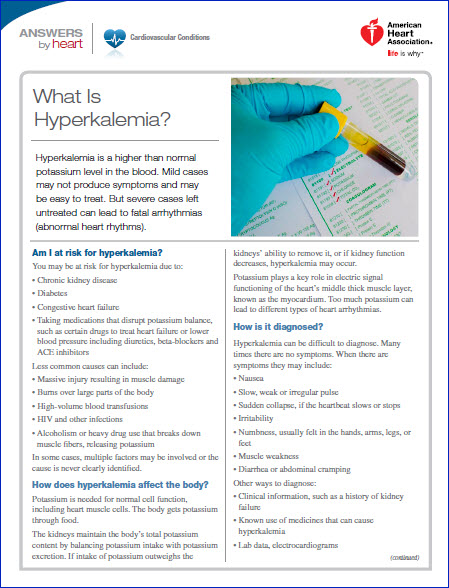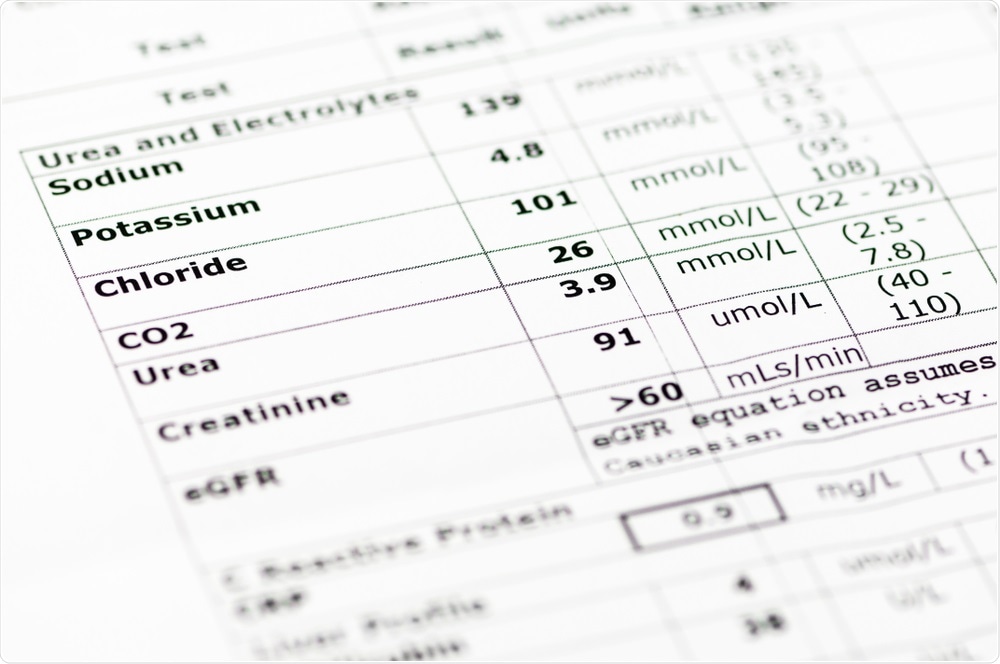Normally your blood potassium level is 36 to 52 millimoles per liter mmolL. The total amount of potassium in the adult body is about 45 millimole mmolkg body weight about 140 g for a 175 pound adult.
 Hyperkalemia High Potassium American Heart Association
Hyperkalemia High Potassium American Heart Association
Blood Potassium Levels Normal blood potassium levels can range from 35 to 52 millimoles per liter or mmolL according to 2007 Current Consult Medicine Total body potassium stores are approximately 50 milliequivalents per kilogram of body weight or mEqkg.
/hyperkalemia-symptoms-5ad4e0b0642dca00363403f9-632e11ad1a4149e181fe7be2519de615.png)
What should my potassium level be. Good sources of dietary potassium include. The normal range of potassium level in the body is 32 mmolL to 52 mmolL. Kidney disease is one of the reasons for the high potassium level.
More than 95 percent of the bodys potassium is stored in the ICF. Usually levels under 25 mmolL are considered to be very serious. A very low potassium level less than 25 mmolL can be life-threatening and requires urgent medical attention.
Potassium balances the effects of sodium and helps keep fluid levels within a certain range. Fruit particularly bananas. The amount of potassium you will be given depends on your potassium level.
Diuretics water retention relievers Excessive laxative use. In rare cases potassium levels may be low through a poor diet. You will receive potassium to bring your levels back to normal.
Most potassium resides intracellularly and a small amount is in extracellular fluid 2-4. Normal body levels of potassium are important for muscle function. The kidney controls the level of potassium in body fluids by controlling the amount of potassium to be excreted.
Foods that are high in potassium include. Nuts and seeds. Causes of potassium loss include.
This may be given as a pill or IV. Occasionally low potassium is caused by not getting enough potassium in your diet. Normal levels of potassium range from 35 mmolL to 51 mmolL in adults.
High-potassium levels can cause serious symptoms including an. If the potassium level is increased above 60 mmolL patient requires medical intervention. A number of studies have shown an association between low potassium intake and increased blood pressure and higher risk of stroke.
Vomiting diarrhea or both also can result in excessive potassium loss from the digestive tract. Research also indicates that. Your body should maintain a specific amount of potassium in the blood ranging from 36 to 52.
Potassium relaxes the walls of the blood vessels lowering blood pressure and protecting against muscle cramping. Read more about the potassium test on Lab Tests Online UK. According to the Mayo Clinic a normal range of potassium is between 36 and 52 millimoles per liter mmolL of blood.
What foods are high in potassium. Reference ranges are not the exact same at every laboratory. A potassium level higher than 55 mmolL is.
Alcohol use excessive Chronic kidney disease. It is critical to the proper functioning of nerve and muscles cells particularly heart muscle cells. 1 mmol 1 milliequivalent mEq or 391 mg potassium 3.
Your hospital may use a slightly different normal range so check this locally What Happens in CKD Potassium levels can increase hyperkalaemia. People with chronic kidney disease or CKD should avoid or limit foods that are high in potassium. The normal range for the acceptable potassium level varies slightly between different laboratories but the National Institutes of Health report it as 37 to 52 milliequivalent per liter.
Your daily potassium needs can depend on various factors including your health status and activity level. Normal blood potassium level is 35-50 mmollitre.
 Six Steps To Controlling High Potassium National Kidney Foundation
Six Steps To Controlling High Potassium National Kidney Foundation
:max_bytes(150000):strip_icc()/diet-for-managing-hyperkalemia-4138591_v2-905e3f02aa5446aa822a2806a7abba75.png) Low Potassium Diet Benefits And How It Works
Low Potassium Diet Benefits And How It Works
High Potassium Hyperkalemia Causes Prevention Treatment American Kidney Fund Akf
 The Potassium Levels During The Laparotomy It Shows That The Potassium Download Scientific Diagram
The Potassium Levels During The Laparotomy It Shows That The Potassium Download Scientific Diagram
 Hyperkalaemia High Potassium Level In The Blood Health Life Media
Hyperkalaemia High Potassium Level In The Blood Health Life Media
/hyperkalemia-symptoms-5ad4e0b0642dca00363403f9-632e11ad1a4149e181fe7be2519de615.png) Hyperkalemia Overview And More
Hyperkalemia Overview And More
 Low Potassium Levels In Covid 19 Disease
Low Potassium Levels In Covid 19 Disease
 What Causes Low Potassium How To Treat Hypokalemia
What Causes Low Potassium How To Treat Hypokalemia
:max_bytes(150000):strip_icc()/health-benefits-of-potassium-4588613-01-3cfc3aa72d504ae0bc68dcfc9fef0b30.png) Potassium Benefits Side Effects Dosage And Preparation
Potassium Benefits Side Effects Dosage And Preparation
 10 Effects Of Hyperkalemia On The Body
10 Effects Of Hyperkalemia On The Body
 Kidney Disease And Potassium Diet Do S And Don Ts
Kidney Disease And Potassium Diet Do S And Don Ts
 6 Alarming Symptoms Of Low Potassium Levels In The Body Potassium Rich Foods Potassium Foods High Potassium Foods
6 Alarming Symptoms Of Low Potassium Levels In The Body Potassium Rich Foods Potassium Foods High Potassium Foods
 Six Steps To Controlling High Potassium National Kidney Foundation
Six Steps To Controlling High Potassium National Kidney Foundation
 Potassium Disorders Hypokalemia And Hyperkalemia American Family Physician
Potassium Disorders Hypokalemia And Hyperkalemia American Family Physician

No comments:
Post a Comment
Note: Only a member of this blog may post a comment.